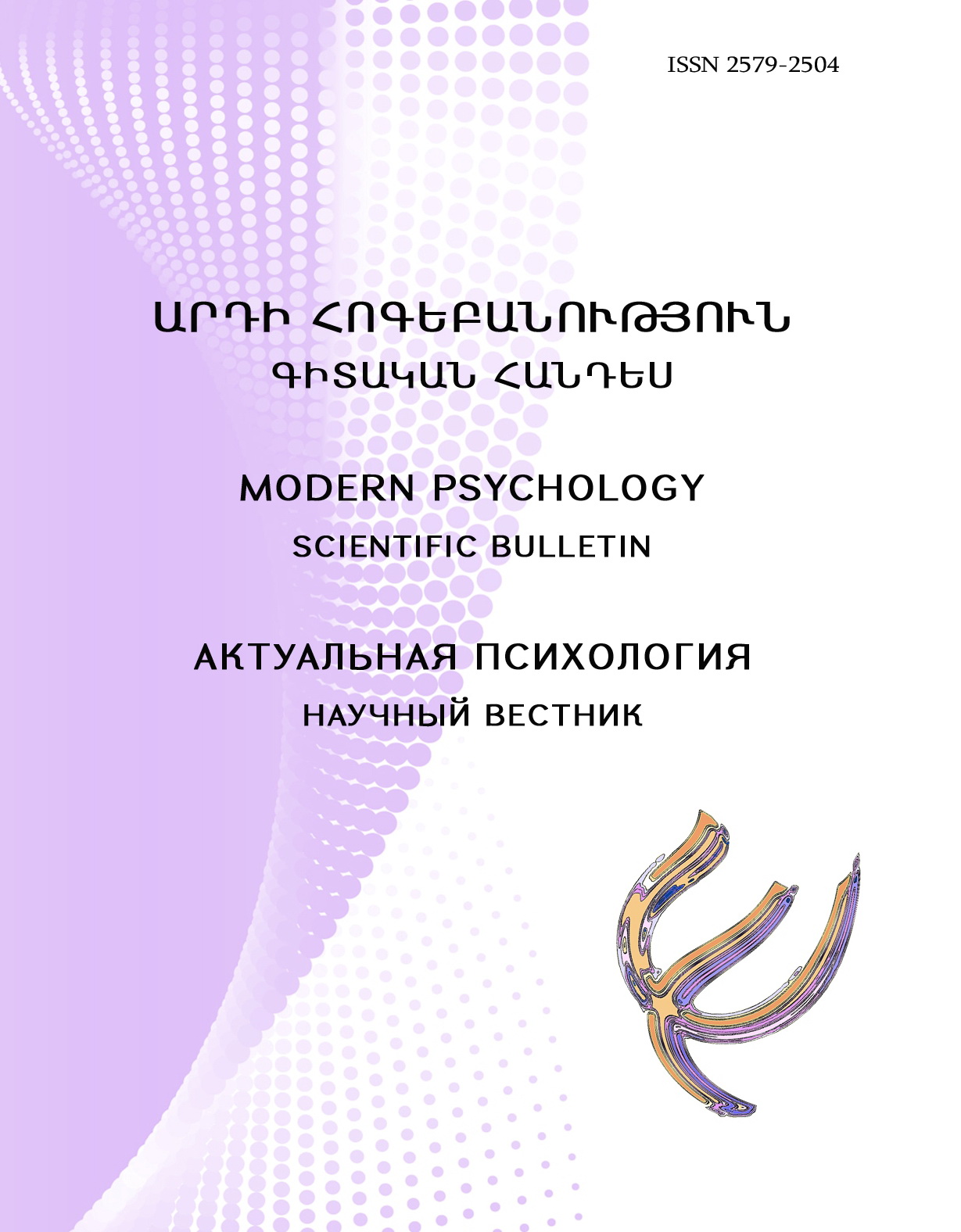PSYCHOLOGICAL FACTORS OF THE CREATIVITY MANIFESTATION OF MODERN MANAGERS
DOI:
https://doi.org/10.46991/SBMP/2023.6.2.046Keywords:
creativity, psychological factors, modern manager, motivation, correlationAbstract
The psychological factors of creativity manifestation and their study results are shown in this article. The aim of this article is to show the psychological factors of the creativity of the modern manager and their correlation. The survey was conducted among 260 middle managers in the private and public sector. Questionnaire, testing and correlation extraction methods were used for the research. F. Williams creativity discovery methods (tests of divergent thinking and personal qualities), Cettel's 16-factor questionnaire, Potemkin's test of "social-psychological positions of a person in the motivational-demand sphere" were used. Among the managers, the average high level of creativity is combined with the average level of self-esteem, the striving for self-improvement and self-development, the freedom to express thoughts, the ability to develop and improve ideas, the spark of new ideas, the fear of making mistakes, ordinary thinking and giving in to the opinion of the majority are important contributing factors. We conclude that the manager's creativity is determined by psychological factors and their unique correlation. We can state that the education and training of modern managers can receive new content, taking into account the importance of creativity as a systemic quality and the specifics of its manifestation.
References
References
Abel, G. (2009). The riddle of creativity: Philosophy's view. In P. Meusburger, J. Funke, & E. Wunder (Eds), Milieus of creativity. Knowledge and space, vol. 2, pp. 53-73, Dordrecht: Springer. https://doi.org/10.1007/978-1-4020-9877-2_5
Amabile, T.M., (2012). Componential Theory of Creativity. In: Kessler, E.H., Ed., Encyclopedia of Management Theory, Sage Publications, London, 134-139. http://dx.doi.org/10.4135/9781452276090.n42
Cattell, H. E. P., & Mead, A. D. (2008). The Sixteen Personality Factor Questionnaire (16PF). In G. J. Boyle, G. Matthews, & D. H. Saklofske (Eds.), The SAGE handbook of personality theory and assessment, Vol. 2. Personality measurement and testing, pp. 135–159). Sage Publications, Inc. https://doi.org/10.4135/9781849200479.n7
Cropley, A. (2006, July). In praise of convergent thinking. Creativity Research Journal, 18(3), 391-404. https://doi.org/10.1207/s15326934crj1803_13
Frensch, P. A. & Funke, J. (1995). Definitions, traditions, and a general framework for understanding complex problem solving. In P. A. Frensch, & J. Funke (Eds.), Complex problem solving: The European perspective (pp. 3–25). https://doi.org/10.4324/9781315806723
Funke J. (2009). On the Psychology of Creativity, Milieus of Creativity An Interdisciplinary Approach, to Spatiality of Creativity, 11-25. https://doi.org/10.1007/978-1-4020-9877-2_2
Isaksen S. (2009) . Exploring the Relationships Between Problem-Solving Style and Creative Psychological Climate, p.169-188. :10.1007/978-1-4020-9877-2_9
Kurtzberg T., Amabile, T. (2001) From Guilford to Creative Synergy: Opening the Black Box of Team-Level Creativity, Creativity Research Journal 13(3):285-294, Creativity Research Journal 13(3):285-294,:10.1207/S15326934CRJ1334_06
Lenk, H. (2009). Creativity: Multidimensional Associative or Chaotic Process? Methodological Comments on Creative Processes and Metaphors in Aesthetics and Innovation. In: Meusburger, P., Funke, J., Wunder, E. (eds) Milieus of Creativity. Knowledge and Space, vol 2. Springer, Dordrecht. p.73-95, 10.1007/978-1-4020-9877-2_6
Meusburger, P. (2009). Milieus of creativity: The role of places, environments, and spatial contexts. In P. Meusburger, J. Funke, & E. Wunder (Eds), Milieus of creativity. Knowledge and space (Vol. 2, pp. 97-155). Dordrech: Springer. https://doi.org/10.1007/978-1-4020-9877-2_7
Sternberg, R. (2009). Domain-Generality Versus Domain-Specificity of Creativity, Milieus of Creativity An Interdisciplinary Approach, to Spatiality of Creativity, p.25-38, 10.1007/978-1-4020-9877-2_3
Практическая психодиагностика. Методики и тесты. Учебное пособие. / Ред. и сост. Райгородский Д. Я., Самара, 2001, -672с.
Туник Е. Лучшие тесты на креативность. Диагностика творческого мышления, Питер: СПб, 2013,- 320 с.
Downloads
Published
Issue
Section
License
Copyright (c) 2023 Sona Poghosyan

This work is licensed under a Creative Commons Attribution-NonCommercial 4.0 International License.



